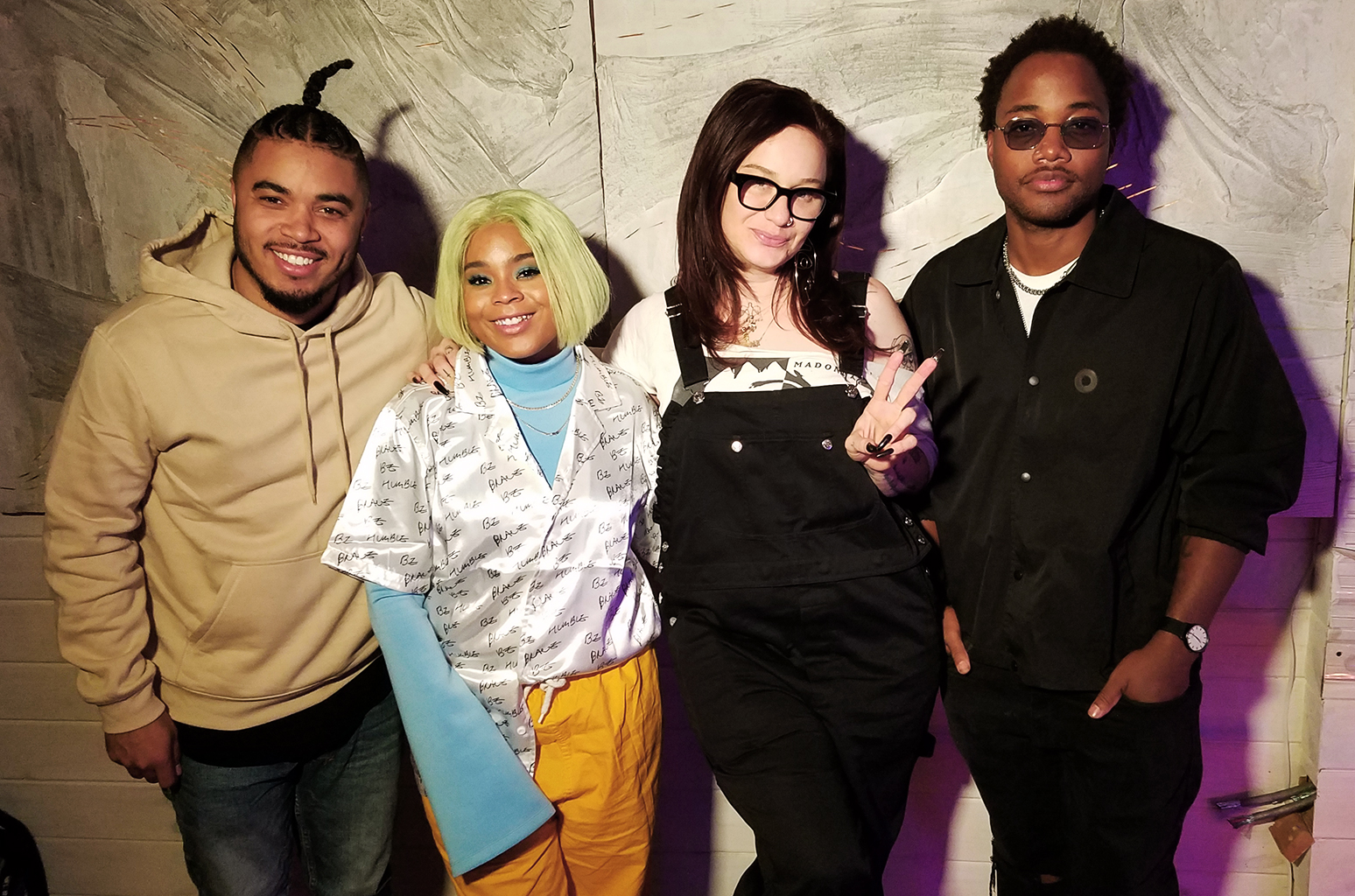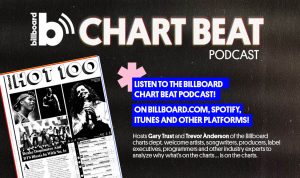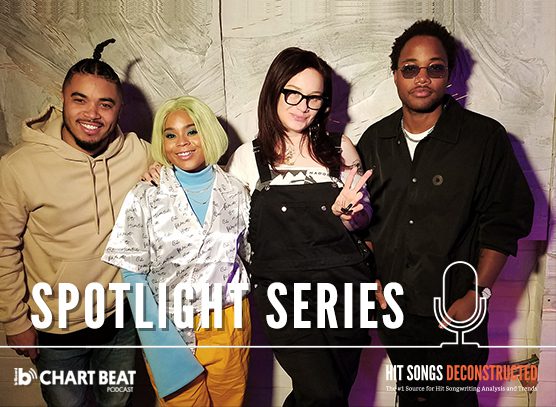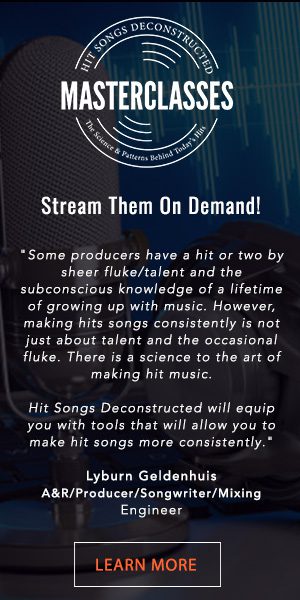A Roundtable Discussion with Tayla Parx, Tommy Brown, Sarah Hudson, Leon Thomas, Lara Andersson, and Jessie Saint John


From left: Tommy Brown, Tayla Parx, Sarah Hudson and Leon Thomas III, during Parx’s Burnout Camp for musical content creators on Oct. 12, 2019 at Grey Noise Studios in New York City.
Hit Songs Deconstructed’s Yael and David Penn joined forces with Gary Trust and Trevor Anderson, co-hosts of the Billboard Chart Beat Podcast, for a two-part roundtable discussion recorded live from Grey Noise Studios during the last day of Tayla Parx’s Burnout. Burnout is the first creator experience that not only focuses on the creation of great songs, but the protection of great songwriters through the addition of seld-care, mindfulness and Mind/Body/Spirit awareness practices as an integral part of the camp.
Joining them for this roundtable discussion were Tayla Parx, who co-wrote Ariana Grande’s first two #1 hits, Thank U, Next and 7 Rings, Khalid and Normani’s Love Lies and Panic! at the Disco’s High Hopes, in addition to several other Hot 100 hits by the likes of BTS, Mariah Carey, and Fifth Harmony; Tommy Brown, who co-wrote and co-produced Ariana Grande’s Thank U, Next, and 7 Rings after first hitting the Hot 100 Top 10 with The Black Eyed Peas’ 2011 No. 3 hit Just Can’t Get Enough; Sarah Hudson, performing artist and co-writer of Katy Perry’s 2014 chart-topper Dark Horse and Iggy Azalea’s No. 3 hit Black Widow; Leon Thomas III, a member of the production duo, The Rascals, who have produced songs for artists such as Ariana Grande, Ty Dolla Sign, and Post Malone; Lara Andersson, a Scandinavian writer who has shared the studio with Parx and Justin Tranter, and Jessie Sant John who co-wrote Truth Hurts.
In Part 1 of this insightful podcast, we dive into the state of today’s music industry, the importance of personal wellness, and what inspired the creation of Burnout.
Part 2 of this all-star roundtable with #1 hit songwriters and producers Tommy Brown, Leon Thomas, Jessie Saint John, Sarah Hudson, and Tayla Parx dives into what it takes to craft a hit.

To listen to Part 1, click here.
To listen to Part 2, click here.
On Writing and Producing a Hit
“You have to know when to take that risk. And that comes with becoming a seasoned writer and knowing structure, and understanding that there is a bit of a science to a song. We understand that repetition is good, we understand the things that the human brain understands better… it is a bit of a psychological game as well, and that’s something that you learn with collaboration and with other people, and you learn it over time, because that’s the skill that goes into consistently making popular songs or hit songs.” – Tayla Parx
“… [the hook] has to be the most memorable part, in a sense that we can go, ‘oh hey, I know this part. I wanna sing it again.’ By the time you hear it at the end, it’s like, you should know the hook already. It all sets each other up, each part of the song. But I feel like verses, bridges and pre’s, those are areas you can get a little more creative. And then break it down in the hook of something simple and something memorable and something that just gets the whole point across of the song.” – Sarah Hudson
“I think it’s great if you can sneak in the same melody a bunch of different times, but every time you hear it, it feels different… and you don’t know that you are singing the same melody over and over.” – Jesse Saint John
“…we have to think about that too, how are they [the artist] going to engage with their fans?” – Tayla Parx
“I personally feel as a producer, I’m always just in that room listening and trying to find that thing that just gives me, like, just the hair standing up on my arms… Baby Face, I worked with him for years, and he said, ‘if I don’t have that hands up in the air moment at the hook, we’re not doin it!'” – Leon Thomas III
“I go and I listen to songs and I deconstruct them myself in different ways… if I go and listen to, let’s say the Camila song with Shawn Mendes, I’ll count and be like, the same melody repeated 14 times before the second verse. So what I try to do musically, I’ll try and keep the same part repetitive under what they’re doing if they’re not repeating, and a lot of times people don’t catch that because it sits in the background. So I just try to study the music and understand the structure. Something has to repeat because, just like the song has a hook, the beat has to have three parts, the beat has to have a hook, has to have a verse, you know what I’m saying? So I try to keep something repeating in the music.” –Tommy Brown
On Collaborating and Playing to Your Strengths
“There is such an art form to collaboration and I think one of the things, for me, is walking into the room and having no ego… we are there to make the best song and do what’s best for the song.” – Sarah Hudson
“Everybody has to play their part in the room… play to your strengths… and if you are not that person, bring in that person to be that person with you. Collaborate then.” –Tayla Parx
“When you are with a group of writers, you need to know why you are there… I’m here for a reason, because they want my brain, and they’re here for a reason because I want what they have.” – Jesse Saint John
“I try not to shoot down any ideas because everybody is great at something, so I try to pull what’s great from who I’m around, because if his melodies are crazy, or his chords, I’m going to look to him for that. I’m not going to be like, ‘no, let me play those chords,’ …it’s always what’s best for the song.” –Tommy Brown
“…that’s the whole part about managing and balancing ego… do your thing. Do it and be great at it and swallow your pride a little bit and keep pushing because it’s always what’s best for the song.” – Leon Thomas III
“…producers, what they always forget – or beat makers, because they are not the same thing – they do too much on the song and forget that the artist is the star. They want their production to be the star. The production is never the star. Let the artist shine, or the song, or whatever it is…- Tommy Brown
“You have to know your weaknesses – be a good collaborator – ’cause that’s the only way you’re gonna get the hit song.” –Tayla Parx
Why Is this an Important Moment in Popular Music?
“We are in a beautiful time in music, right now in general, like to where you can break the rules. Now, it wasn’t this five years ago. I feel like if she [Billie Eilish] came out at a different time, they [fans] wouldn’t have gotten it. This is the perfect time that people want to know more. They’ve been listening to the same thing for so long, the same artists for so long, they’re like, ‘I NEED something, something, give me something, anything.’ So now is the perfect time for writers to take advantage of the moment in time we are in music, because it only changes every few years and you gotta either be the creator of the way to be a part of that, or you get washed away behind.” –Tayla Parx
“Definitely some rules that are very important, we always want to have that format working. But I think there’s definitely room for a lot of rule breakers in this industry right now. I feel like we are celebrating the weirdos, we are celebrating shit that feels like, ‘Man, I haven’t seen that before, I haven’t heard that before, what is that, how’d you do that?’ If people go, ‘how’d you do that?,’ I think you’re kinda in a good state.” – Leon Thomas III
“I also think we are in a really cool era where audiences are buying into artists… I feel like a lot more people are kind of like, ‘OK, I like this girl, I want to know what she has to say, I’m going to go back and discover her whole catalogue.'” – Jesse Saint John
Why Burnout?
“Man, a little bit of everything inspired burnout, from my own personal experiences with literally finding out that my stress and my anxiety… something that I thought just stopped and disappeared after college… was affecting my body physically. And so my own personal experience with that and realizing, ‘this is fun for you, right?’ and checking in with myself… it wasn’t like the creating part [that was so draining], but it was everything else around it and not understanding that I have to refuel… Which is why for Burnout, I was like, let’s give people the tools.” – Tayla Parx
“Normally labels put on camps or publishers put on camps, which is dope… but we’re grinded in those camps. Every morning, like I was saying earlier, it’s like, ‘Wake up, coffee, write, go to bed, wake up, coffee, write, go to bed,” you know? And we burnout. So I think for [Tayla] to step in this position and put on this camp and say, ‘I know what it’s like to be a creator, and we need to nurture our spirits and our hearts and THEN we can create,’ I mean that’s… that’s what it’s about.” – Sarah Hudson
On the Evolving Role of Songwriters and Producers
“Being an actual, true producer versus like a beat maker, it’s a different process. So I take the approach of like the Quincy’s… Quincy didn’t play every instrument or do every drum on the track. You go and you produce the song to give the song the best chance that it has. So I may go get violins from Brooklyn and a drummer from LA, but that’s how a lot of times a lot of hands get in the pot when you’re looking at it from a producer’s standpoint.” – Tommy Brown
“I think when the role of the A&R changed, the role of the songwriter changed. I think that you used to have A&R and things like that who actually were in the room, and not just to say they were in the room. It was actually… You’re curating the sound, like you’re actually in it. I think that role changed, and now the songwriters are damn near A&Rs. Now… the songwriters… and the producers as well, are pulling the best out of these artists. They’re doing what some of the best A&Rs that we can go back to… really truly did.” – Tayla Parx
On the Business Side of Hit Songwriting
“You can’t trust just anybody to run administration. You genuinely have to look over everybody’s shoulder and make sure things are being done right, comb through every contract, make sure things are making sense, you know? And that does add a little bit of pressure to the process. But, you know, Tayla, I can say, has really really stepped up in the world of being not just a great creator, but a really great executive.” –Leon Thomas III
“There’s like a language barrier… Very much it’s two sides: suits and creators. So, what is the way to combine these worlds? …That means we have to have more suits that are actually coming back in the studio, like what happened back in the day, building these relationships with these people that are creating.” – Tayla Parx
On the Impact of Burnout Camp
“I think, at least once a week, taking a day to just dedicate to me.” – Tommy Brown
“Seeing what it was like with this guided meditation, I feel like it would be really awesome to kind of just maybe go out to a park and just really check in with myself and check in with nature… I think that’s really, to me, something that I think I’m gonna work into my personal day.” – Leon Thomas III
“Yesterday I worked with a new writer, and I’m always a bit apprehensive at first just ’cause like, you know you have to open up the whole world… but I loved writing with this writer yesterday… So ya, I think just opening up myself to newer faces, new artists, newer writers… I think that’s something I definitely take away from this.” – Sarah Hudson
“Tayla pointed out how efficient we’ve been with our time because we go straight to breakfast to the activities to the sessions. And I think about how much empty time I have on any given day and most people must also have on their phones or just kind of zoning out… Sometimes that’s needed, but if you can take that time and use it for one of the activities we learned, like, that’s so much more beneficial.” – Lara Andersson
“The fact that you guys were so open to experiencing everything, and the fact that it also affected you in a positive way, that’s something that I’m going to remember for the rest of my life. And I’m super happy that you’re telling your friends and your producers and stuff about it back at home, because that is really the point of this. So that looking back… 20 years from now, this is the new normal.” – Tayla Parx



